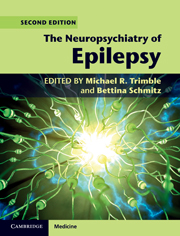Book contents
- The Neuropsychiatry of Epilepsy
- The Neuropsychiatry of Epilepsy
- Copyright page
- Contents
- Contributors
- Chapter 1 Introduction
- Chapter 2 Neuropsychiatric disorders in epilepsy: epidemiology and classification
- Chapter 3 Genetic disorders associated with intellectual disability
- Chapter 4 Epilepsy and autistic spectrum disorders
- Chapter 5 Subtle cognitive and behavioral effects of epilepsy
- Chapter 6 Dementia and epilepsy
- Chapter 7 Peri-ictal psychiatric phenomena
- Chapter 8 Postictal psychoses: established facts and new clinical questions
- Chapter 9 The interictal dysphoric disorder
- Chapter 10 Behavioral and neuropsychological aspects of frontal and temporal lobe epilepsy
- Chapter 11 Emotional agnosis and theory of mind
- Chapter 12 Nonepileptic seizures
- Chapter 13 The effects of antiepileptic drugs on behavior
- Chapter 14 Antiepileptic drugs and suicide
- Chapter 15 Antiepileptic drugs and cognitive disorders
- Chapter 16 Psychiatric illness and psychotropic medication use in epilepsy
- Chapter 17 Psychiatric effects of surgery for temporal lobe epilepsy
- Chapter 18 Brain mechanisms of impaired consciousness in epilepsy
- Index
Chapter 11 - Emotional agnosis and theory of mind
Published online by Cambridge University Press: 07 October 2011
- The Neuropsychiatry of Epilepsy
- The Neuropsychiatry of Epilepsy
- Copyright page
- Contents
- Contributors
- Chapter 1 Introduction
- Chapter 2 Neuropsychiatric disorders in epilepsy: epidemiology and classification
- Chapter 3 Genetic disorders associated with intellectual disability
- Chapter 4 Epilepsy and autistic spectrum disorders
- Chapter 5 Subtle cognitive and behavioral effects of epilepsy
- Chapter 6 Dementia and epilepsy
- Chapter 7 Peri-ictal psychiatric phenomena
- Chapter 8 Postictal psychoses: established facts and new clinical questions
- Chapter 9 The interictal dysphoric disorder
- Chapter 10 Behavioral and neuropsychological aspects of frontal and temporal lobe epilepsy
- Chapter 11 Emotional agnosis and theory of mind
- Chapter 12 Nonepileptic seizures
- Chapter 13 The effects of antiepileptic drugs on behavior
- Chapter 14 Antiepileptic drugs and suicide
- Chapter 15 Antiepileptic drugs and cognitive disorders
- Chapter 16 Psychiatric illness and psychotropic medication use in epilepsy
- Chapter 17 Psychiatric effects of surgery for temporal lobe epilepsy
- Chapter 18 Brain mechanisms of impaired consciousness in epilepsy
- Index
Summary
Keywords
- Type
- Chapter
- Information
- The Neuropsychiatry of Epilepsy , pp. 109 - 123Publisher: Cambridge University PressPrint publication year: 2011
- 4
- Cited by

